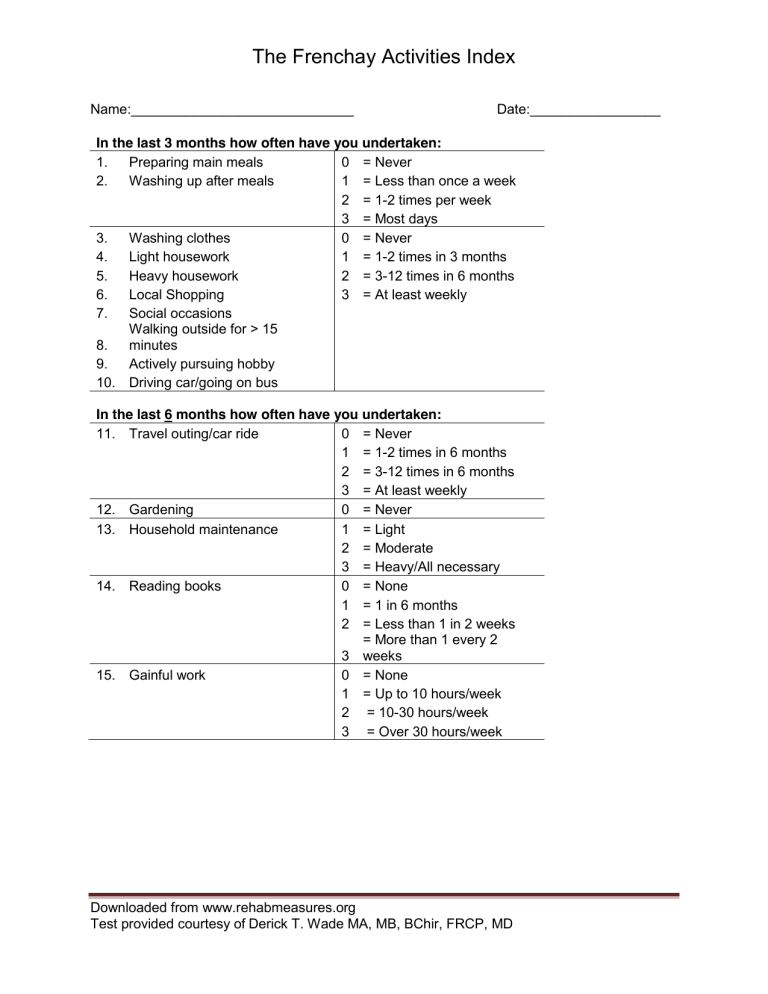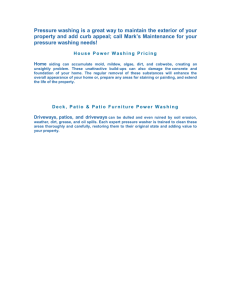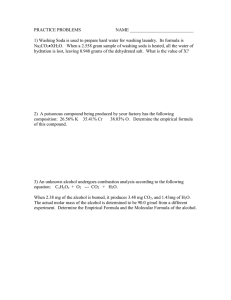Frenchay Activities Index
advertisement

The Frenchay Activities Index Name:_____________________________ Date:_________________ In the last 3 months how often have you undertaken: 1. Preparing main meals 0 = Never 2. Washing up after meals 1 = Less than once a week 2 = 1-2 times per week 3 = Most days 3. Washing clothes 0 = Never 4. Light housework 1 = 1-2 times in 3 months 5. Heavy housework 2 = 3-12 times in 6 months 6. Local Shopping 3 = At least weekly 7. Social occasions Walking outside for > 15 8. minutes 9. Actively pursuing hobby 10. Driving car/going on bus In the last 6 months how often have you undertaken: 11. Travel outing/car ride 0 = Never 1 = 1-2 times in 6 months 2 = 3-12 times in 6 months 3 = At least weekly 12. Gardening 0 = Never 13. Household maintenance 1 = Light 2 = Moderate 3 = Heavy/All necessary 14. Reading books 0 = None 1 = 1 in 6 months 2 = Less than 1 in 2 weeks = More than 1 every 2 3 weeks 15. Gainful work 0 = None 1 = Up to 10 hours/week 2 = 10-30 hours/week 3 = Over 30 hours/week Downloaded from www.rehabmeasures.org Test provided courtesy of Derick T. Wade MA, MB, BChir, FRCP, MD The Frenchay Activities Index Revised guidelines for using the Frenchay Activities Index The aim is to record activities which require some initiative from the patient. It is important to concentrate upon the patient’s actual frequency of activity over the recent past, not distant past performance nor potential performance. One activity can only score on one item. Specific item information: 1. Needs to play a substantial part in the organization, preparation and cooking of main meal. Not just making snacks or reheating prepared food. 2. Must do all or share equally, e.g. washing or wiping and putting away. Not just rinsing an occasional item. 3. Organization of washing and drying clothes, whether in washing machine, or by hand or at laundromat. Sharing task equally, e.g. loading, unloading, hanging, folding. 4. Dusting, polishing, ironing, tidying small objects or bedclothes. Anything heavier is included in item 5. 5. All heavier housework including changing beds, cleaning floors, fires and windows, vacuuming, moving chairs, etc. 6. Playing a substantial role in organizing and buying groceries, whether small or large amounts. Must go to the shop and not just push a cart. Can include collection of pension or going to the Post Office. 7. Going out to clubs, church activities, cinema, theatre, drinking, to dinner with friends, etc. May be transported there, provided patient takes an active part once arrived. Includes social activities at home, initiated by the patient, e.g. visits from family or friends not where main purpose is to provide care. 8. Sustained walking for at least 15 minutes (allowed short stops for breath). About one mile. Can include walking to do shopping, provided walks far enough. 9. Must require some ‘active’ participation and thought, e.g. propagating or caring for houseplants, knitting, painting, games, sports (not just watching sport on television). Can be mental activities, e.g. reading specialist magazines, doing the stocks and shares or window shopping for pleasure. 10. Must drive a car (not just be a passenger), or get to a bus/coach and travel on it independently. 11. Coach or rail trips or car rides to some place for pleasure. Not for a routine ‘social outing’ (i.e. shopping, going to local friends). Must involve some organization and decision-making by the patient. Excludes trips organized passively by institutions unless patient exercises choice on whether to go. The common factor is travel for pleasure. Holidays within the six months are divided into days per month e.g. a 7-day holiday equals 1 or 2 days per month. 12. Gardening outside: a. Light = occasional weeding or sweeping paths b. Moderate = regular weeding, raking, pruning, etc. c. Heavy = all necessary work including heavy digging. 13. Household maintenance: a. Light = repairing small items, replacing lamp light bulb or plug b. Moderate = spring cleaning, hanging a picture, routine car maintenance c. Heavy = painting/decorating, most necessary household/car maintenance. 14. Must be full-length books, not periodicals, magazines or newspapers. Can be talking books. 15. Work for which the patient is paid, not voluntary work. The time worked should be averaged out over six months. For example, one month working for 18 hours/week over the six-month period would be scored as ‘up to 10 hours/week’. Downloaded from www.rehabmeasures.org Test provided courtesy of Derick T. Wade MA, MB, BChir, FRCP, MD

